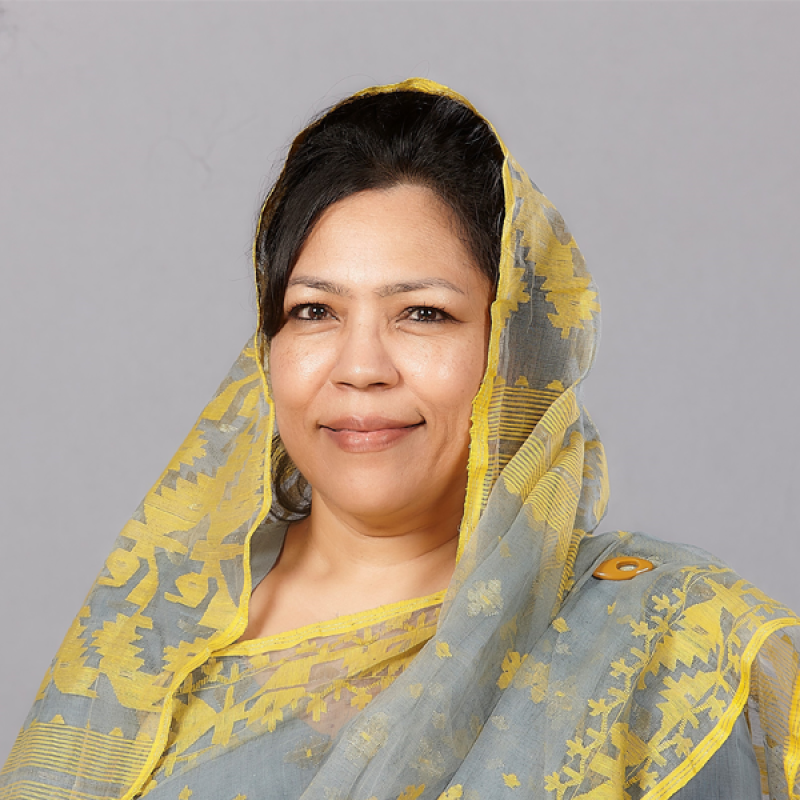- New Approach Must for Dhaka to Break Climate Aid Debt Trap |
- UN High Seas Treaty Clears Ratification, Set for 2026 |
- UAE Suspends Visas for Bangladesh, Eight Other Nations |
- Young disabled people of BD vow to advocate for peace |
- World Leaders Urged to Defend Human Rights and Justice |
New Approach Must for Dhaka to Break Climate Aid Debt Trap
Climate Debt Risk Index (CDRI) developed for LDCs by Change Initiative aired

Dr. Farhina Ahmed, Secretary, Ministry of Environment and Climate Change.
How Bangladesh should overcome a loan-driven climate debt trap that it already is in was the topic of discussion at a national dissemination of Climate Debt Risk Index (CDRI) developed by the Change Initiative, a Dhaka-based think tank, in the capital on Saturday.
The per capita cumulative climate debt stands at 79.67 US Dollar and it is likely to grow further as the developed countries and multilateral donors have consistently moved from grant to loan as a means of climate financing for Least Developed Countries, the dissemination was told.
The CDRI has been developed to measure compounded risks by evaluating LDCs and climate vulnerable countries across debt, fiscal and climate vulnerability indicators. The 2025 CDRI coverage expands to 48 LDCs and 4 recent graduates, offering improved insights into climate-debt risks and pathways to reform international finance.
It shows Bangladesh’s overall debt to grant ratio at about 3: 1, highest among 55 LDCs, and the Multilateral Development Banks debt to grant ratio 0.94 which reflects the MDB average. Again, when it comes to the choice of projects donors fund mostly mitigation projects although the national priority is for adaptation.
Worse even is the fact that energy absorbs the majority share of the loan dominated financing while agriculture, industry, disaster preparedness, health and industry are significantly underfunded. Then again 18.84 percent funds channelled to fossil fuel project and attributed as climate finance, inflating Bangladesh’s loan ratio from 2.07 to 2.70 and compromising resilience.
Presenting the findings of the CDRI Tanmay Saha pointed out how climate financing has moved away from polluter pay principle to one of broken promises and this is heavily affecting Bangladesh the 7th most climate disaster affected country of the world due to financing shortfall to the tune of 37 percent this year.
He however pointed out that availability of fund is dependent not merely on climate vulnerability but also on bargaining power and climate diplomacy making mention of South Sudan as a high climate finance recipient country.
Tanmay Saha made a plea for breaking the climate debt trap because the nation is paying for vulnerabilities it has not created on its own.
Managing Director of Change Initiative Zakir Hossain Khan said as the CDRI helps to better understand the climate financing scenario, the focus in COP30 should be on increase of grant-based finance. He lamented that climate financing is dealing with the climate phenomena, not its root cause.
He proposed the setting of a bottom-up Earth Solidarity Fund, reforms of SDGs and expansion of grant-based climate financing. He called for prioritising and rationalising national adaptation planning and governance innovations to cope with the emerging situation. Zakir Hossain Khan made a plea for philanthropic financing to support climate finance and to develop a community stewardship model for this.
Referring to the rise of climate debt from almost 0 to about 90 percent now he said corruption in debt management had a role in this. Still Bangladesh has the scope to take measures and help reverse the pressure on livelihoods of people that debt brings.
Fazle Rabbi Sadeq of PKSF expressed his scepticism about the how much finance will be generated in the coming days as the US has left the Paris agreement and said that actors in Bangladesh have to work collectively to address everything and find fund at least for adaptation and damage and loss.
Golam Rabbani od BRAC made a plea for strengthening climate diplomacy, rebalancing adaptation and mitigation, decentralise climate planning and development planning, and developing a climate-induced loss and damage ledger.
Meher Nigar from the EU Delegation in Dhaka made it clear that EU will work on work on adaptation and mitigation in a blending type of approach, but grant-based approach will probably no longer be there. She said $450 million has been earmarked for renewable energy in partnership of PKSF and EU is exploring other opportunities. The underscored the need for data generation so that there can be targeted operation on vulnerable communities.
Shirin Lira of the Swiss Embassy, Dhaka said the CDRI brings strong evidence that helps both ways for awareness. She however underlined the issues of transparency and accountability in aid governance. One should be pragmatic about how the climate finance is spent. On adaptation Swiss attention is more on local communities and not on the national level which does not flow to the local level. The local communities should be the focus. She called for diversifying financing by taking the private sector both national and international along. He called for segregating the climate part in every development project and making actors ac countable at national level planning and implementation.
Ms Naoka of the Swiss embassy who is the co-chair of the Local Consultative Group on Climate and the environment emphasised accountability of financing as the topic is being widely discussed.
Environment and Climate Change Secretary Dr. Farhina Ahmed said that there is no need to panic that Bangladesh’s debt-GDP ratio is 38 percent because this ratio is 200 percent in Japan. She made a plea for making breakthroughs in carbon trading and said that even the owner of a tourist resort can apply for this trading. She called for the financial institutions of the country to increase their credit ratings. Climate death risk will help people to think and act and create what the country needs to get a win-win situation, she added.

